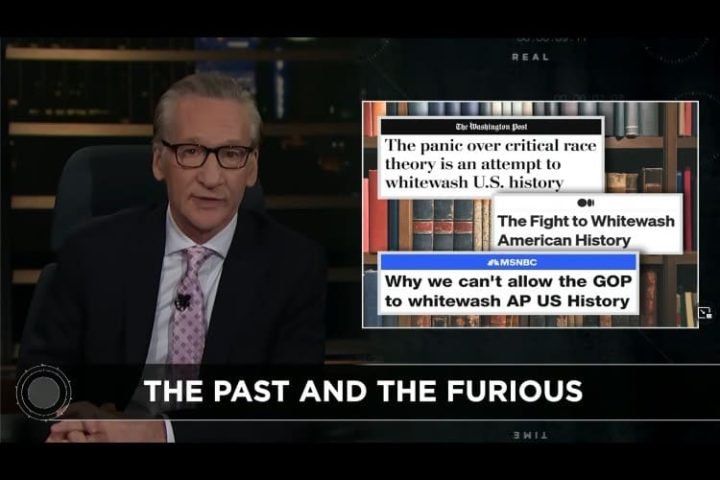
It’s no longer fashionable in the West to fancy your civilization superior and those beyond its borders “barbarians.” Yet this phenomenon has been replaced by another type of chauvinism — the chronological variety — the idea that our time is superior and those in the past were barbarians (at least if they were European) to be held in utter contempt.
Pushing back against this Friday was a man now known for being selectively red-pilled, liberal comedian-cum-commentator Bill Maher. On his HBO show Real Time, Maher criticized a chronological chauvinism phenomenon known as “presentism.” Ironically, though, inherent in Maher’s defense of the past was his own brand of presentism.
Presentism, Maher explained, “means judging everyone in the past by the standards of the present.”
“It’s the belief that people who lived a hundred or five hundred or a thousand years ago,” he then said sarcastically, “really should have known better.” For sure. You may as well condemn medieval people for not knowing that germs cause disease (while supposing that cheap store-bought masks prevent it?).
Calling this notion “stupid,” Maher drew his own analogy. “It’s like getting mad at yourself for not knowing what you know now when you were 10,” he said. “Stupid me, spending all that time raising sea monkeys and playing with slot cards…. Who doesn’t have moments from your past that make you cringe? Who hasn’t said ‘I can’t believe I said that!’ ‘I can’t believe I wore that!’ ‘I can’t believe I thought that!’ ‘I can’t believe I did that!’?”
“Being woke is like a magic moral time machine where you judge everybody against what you imagine you would have done in 1066 — and you always win,” Maher later quipped (video below. Note: contains a bit of salacious material).
Maher’s sentiments were seconded by many. The second-most-popular comment under the above video, for example, reads, “I taught US history for 19 years and always told my students that you cannot judge the past by today’s thinking.” So true. But here’s what’s left unsaid:
We should judge the past — and the present — by timeless thinking.
Maher is correct to bemoan the leftist tendency to unsparingly condemn historical figures for not measuring up to today’s prevailing “values.” Yet inherent in Maher’s defense is acceptance of a tenet of presentism: The notion that, mirroring our technology, our morality actually is comprehensively superior to what came before.
The difference is that Maher is charitable enough to not want to mercilessly torture our forebears’ reputations. Rather, he appears to implicitly prescribe pity. His 10-year-old-self analogy perhaps reflects a certain attitude: Oh, those poor saps who once existed (e.g., the Founders) were like children. Have mercy on them — they just didn’t know any better. As Maher put it while “defending” Columbus, “People back then were generally atrocious.”
Now, philosopher George Santayana is famous for the saying, “Those who cannot remember the past are condemned to repeat it.” Yet this has a corollary: Those who cannot remember the triumphs of the past may be condemned to not be able to repeat them.
This is surely true when one’s moral compass is so warped that he mistakes the past’s triumphs for turpitude.
Where the 10-year-old-self analogy fails is that while wiser heads may lament lost childhood innocence (i.e., absence of sin), they couldn’t likely point to morality displayed by their kiddo self that they lack today and should emulate. Yet the matter is quite different with earlier generations.
Ideally, as philosopher C.S. Lewis points out in his book The Screwtape Letters (1942), the characteristic strengths of one generation should be used to correct the characteristic flaws of another. Thus does evil endeavor to separate the generations — so this can’t happen.
Of course, it’s typical for the standards of people’s time to feel right to them, for them to be inured to its defects, just as a tadpole spawned in a polluted pond knows of nothing but toxins. It’s also true that we do have certain things right today, such as our rejection of the age-old institution of slavery.
Yet here’s another reality: Our ancestors were morally superior to us in a host of ways. They didn’t, for example, imagine a “right” to murder your unborn children or sexually corrupt kids surviving beyond the womb; they knew what marriage was, too, and didn’t claim a boy could switch sexes just by willing it.
The dismissal of the past is understandable, however, given that the ultimate result of the moral relativism prevailing today is to make everything relative to oneself and what’s familiar — such as one’s time. When we know Truth and can use it as our moral yardstick, it frees a person from what G.K. Chesterton called “the degrading slavery of being a child of his age.” But without Truth, the most compelling “morality” guide remaining is emotion. Ergo, “If it feels good, do it” — and the norms of one’s time will generally feel good.
Regardless, those who dismiss the past are either wicked or woolly-headed. The radical French Revolutionaries, infamous for the bloody “Reign of Terror,” attempted to restart history with their new calendar (first year 1792); the communist Khmer Rouge, who exterminated one-quarter to one-third of Cambodia’s population between 1975 and ’79, followed suit with their “Year Zero.” The most malevolent history-hard-drive wipers today are similarly motivated, too: They want to erase the past so they can reshape society in their own twisted image.
Anyone who would wipe away the past should himself be wiped away, at least in terms of political and social influence. The survival of all that’s great and good depends on it.



